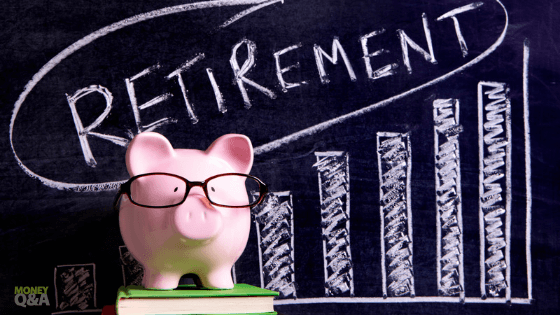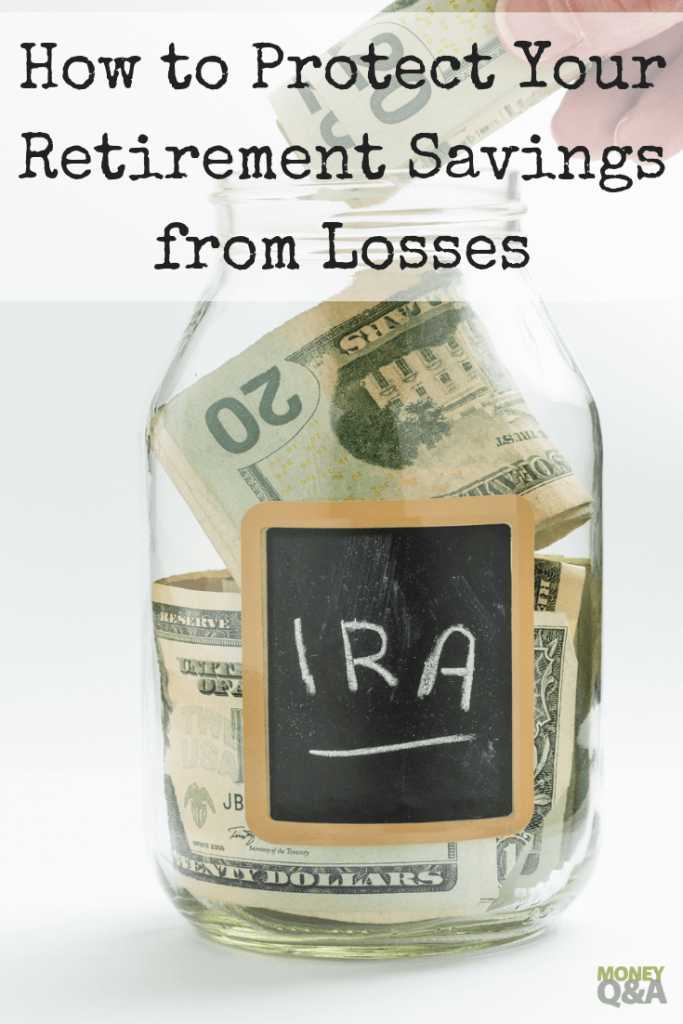Since the 2008 meltdown, adults of all ages have been justifiably concerned about their retirement plans and wondering what they should do if the markets head south again as they approach retirement age. While volatility in the markets is inevitable, there are ways to protect your retirement savings even if there’s a downturn (or even a recession) during your retirement years.
If you’re currently saving for retirement but haven’t fine-tuned your portfolio’s asset allocations to pre-emptively shield yourself against a market downturn, then here are some of the best strategies to protect your retirement savings you’ll want to discuss with your financial advisor.

Adjust Portfolio Allocations Based on Your Age
Saving for retirement in your 40s and 50s is quite unlike saving for retirement in your 20s and 30s. When you’re younger and have 30-40 years before you reach retirement age, you can afford to take more risks with investing because long-term studies consistently show the markets will most likely bounce back over time.
Even if you still have student loans, you should continue investing with a comparatively aggressive strategy (65-85% stocks) to maximize your portfolio’s growth while you still have decades to prepare for retirement. The present recommendation for optimal asset allocations is 110 or 120 minus your age; so a 30 year-old’s portfolio should contain about 80-90% stocks and the rest cash and bonds, while a 50 year-old’s portfolio is about 60-70% stocks and 30-40% cash and bonds.
One great resource to manage your 401k retirement plan is blooom. Let the experts at bloom take a free peek at your 401k. Get real advice on how it’s doing and how it could be performing better. When you become a member, blooom then makes trades to optimize your account based on your goals. Blooom can manage your 401k, 401a, 403b, 457, or Thrift Savings Plan (TSP).
Blooom a great service! I highly recommended. I’ve been using it for over a year now! Check out my full review of blooom.
Have Cash Savings Built Up
You never want to be on the extreme ends of the investment spectrum by investing almost entirely in stocks or entirely in conservative assets like bonds. You also don’t want 100% of your money in an investment account (especially as you come within 5-10 years of retiring) because withdrawing from your IRA or 401K during a market slump would be a huge retirement mistake.
Instead, you should contribute to both your retirement account and a cash account as you come closer to retiring. This way, you’ll be able to cover your expenses without dipping into your investment account(s) in the midst of a market downturn. Financial advisors typically say that seniors should have the equivalent of two years’ worth of expenses saved up in a bank or credit union account to pay the bills whenever the markets head south.

Cover Key Expenses with Guaranteed Income
To avoid needing to withdraw more funds than expected during retirement, you’ll want to calculate your retirement income gap to identify new areas to save money and figure out how much of your non-discretionary spending can be covered by guaranteed income (such as Social Security).
It’s important to remember that your retirement spending may increase, which means you need to overestimate your retirement expenses as much as possible to protect yourself and your financial stability against possible market downturns or unexpected and costly health concerns that could arise.
To reduce expenses to a reasonable monthly amount, some people consider selling their homes to boost their retirement savings and downsize to a more manageable home. This isn’t always the best strategy for some folks (especially if you could have turned that into a source of valuable rental income), but it’s worth considering if you want to shield yourself against another housing market crash and/or find a home with lower property taxes and fewer maintenance requirements.
Don’t Abandon Stocks
A common issue with soon-to-be retirees is that they flee from stocks in fear of a recession that could crash the stock market and wipe out a significant chunk of their savings. However, a retirement account comprised almost entirely of bonds and other conservative investments could be massively detrimental to the longevity of your savings.
To ensure you don’t run out of money during retirement, you still need to include stocks in your portfolio. Yes, there is always a risk of a market downturn that obliterates some of your stocks’ value. But this is temporary because stocks usually bounce back from a bear market within 2-3 years, so be sure to maintain a moderate, growth-driven investment strategy that includes bonds and stocks. ‘
The robo-advisor M1 Finance gives the more established, sophisticated investors great investing options. M1 Finance simplifies the investment process for beginning and experienced investors alike. Unlike other robo-advisors, M1 Finance does not charge a fee, and it gives you the option of taking more control over your investments if you want them (and less if you don’t).
If you’re looking for places to keep traditional investment accounts, you might want to check out investing with Betterment or Stash Invest.
Supplement Income with Dividends
Dividends are great ways to supplement your retirement income because they are consistent, even if the stock value fluctuates along with the rest of the market. Investors frequently add dividend-paying stocks to their retirement portfolios because the power of compounding interest with DRIPs (dividend reinvestment plans) maximizes portfolio growth while stabilizing the nest egg during times of market volatility.
If you invest in dividend stocks, be sure to find one with a good dividend growth rate.
Should I Be Worried About a Future Downturn?
The old adage – “what goes up, must come down” – is very applicable when it comes to investing. Unprecedented market growth and economic expansion cannot sustain itself forever, so people investing for retirement must come to terms with the fact that their portfolios will inevitably plummet in value during a market downturn.
However, it’s important to remember that downturns are only temporary and there are plenty of ways to protect your savings when the markets ultimately fall into a slump. By ensuring you’re able to cover your essential expenses with cash – not withdrawals from your retirement account – and adjusting your portfolio’s allocations to appropriate levels of risk based on your age, then you’ll be much better off during a downturn than the short-sighted folks who panic and immediately pull out of the markets.
What about you? How do you plan to protect your retirement savings?


